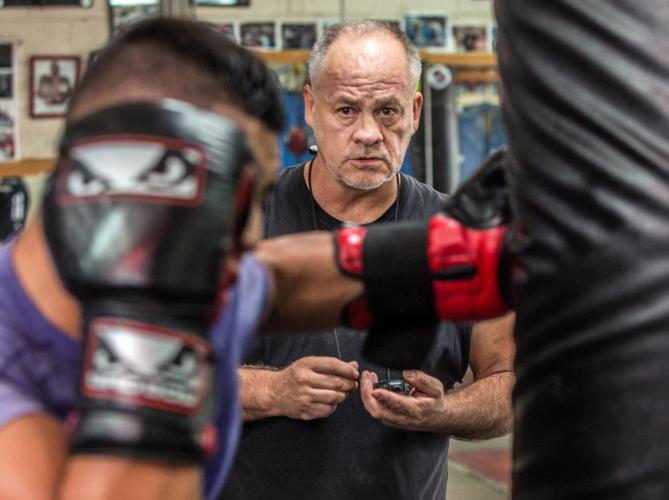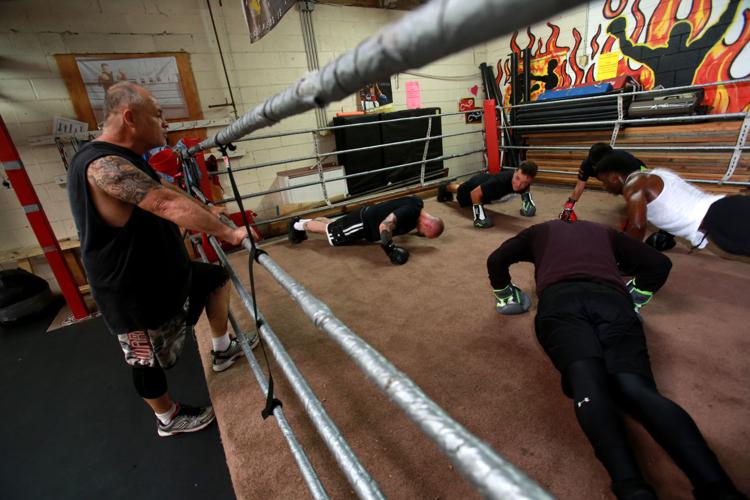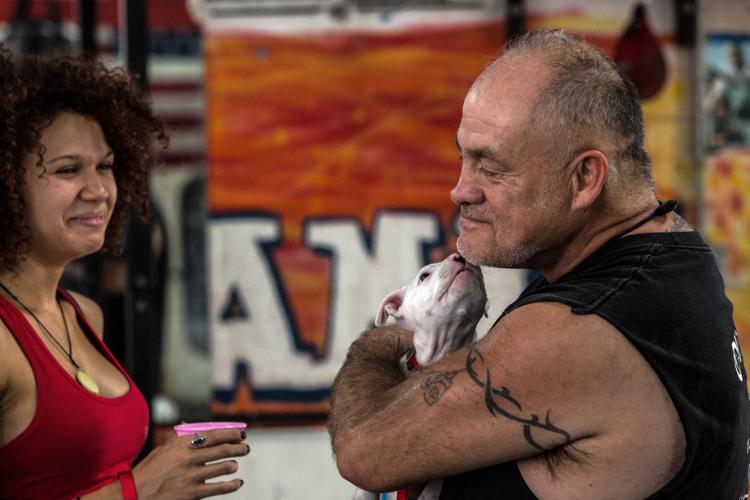The quote from “The Little Prince” author emblazoned on Chris Valdez’s fading wallet embodies Valdez as a boxer, father, coach and man.
Valdez opens the wallet at Tucson Southwest Boxing Academy, where owner Peter Quezada lets him use space for free. The garage-style doors open to 37th Street. The occasional car rumbles by. A fan hums in the background.
He reads the words by French writer Antoine de Saint-Exupéry in French first and then translates: “When you give yourself, you receive more than you give.”
That has been his life’s work since 1985. Valdez, 52, has mentored at-risk youth. He uses boxing, among other things, to teach young people about their worth, their intelligence, their relationships and their purpose.
“I use boxing because we all have fights,” he says. “We’re all fighting something in our heads. We all have a little ring in our heads.”
For the last 13 years, Valdez has trained young boxers and mixed-martial artists, led outdoor excursions, taught survival skills and prepared teens for military service, all under the banner of his nonprofit The Youth Corps of America. For the most part, he is a one-man operation. He calls it the Old School Gym.
The wallet is a tribute to one of the first books he gave his daughter — “The Little Prince” — and to his big heart.
It was a gift from his daughter Randi Valdez, a young woman who shared both her father’s compassionate heart and its afflictions.
This May, Valdez lost his daughter, in her late 20s, to coronary heart failure, a condition he also has. A heart attack survivor, Valdez has two stents in his own heart.
The tragedy “ripped my heart out,” he says.
Valdez is no stranger to heartache. Another daughter, Krista Valdez, died at the age of 17 in a 2002 car crash. He has one child still living — his son, a law student at Arizona State University.
“Both of my daughters were the coolest kids ever,” Valdez says, remembering their interest in his work with at-risk youth. “My daughters would say, ‘Here is my bike. I don’t need it anymore. You can give it to those kids.’ ... My kids, they were like me, they had giant hearts.”
An American hero
Gerardo Robles, 25, can’t pin down how long he has known Valdez — at least four years, he thinks.
Robles, a guitarist, met Valdez, a drummer, through music, not martial arts.
At the time, Robles was struggling to find a job, so Valdez helped him craft a résumé and develop confidence for job interviews. Robles has since landed three jobs and credits Valdez for teaching him how to appear employable. On one interview, Valdez loaned Robles dress shoes so he would look sharp and feel confident.
“He’s helped me out in a lot of ways,” Robles says. “There were times I couldn’t get to work and he would take me to work. ... He would tell me, ‘If you need a place to stay, my door’s open.’ And he’s like that with everybody. If you know him, he will give the shirt off of his back to you.”
That’s why Robles nominated Valdez for the American Heroes Channel’s 2016 Red Bandanna Hero Award.
Of 1,200 submissions from across the country, Valdez was one of five finalists for the award, given in partnership with The Huffington Post and the Welles Remy Crowther Charitable Trust. The organization honors the life of Crowther, a civilian hero at the World Trade Center on 9/11.
Valdez learned last week that he did not win the $10,000 donation to a charity of his choice — a blow to the hope he had harbored for some much-needed help.
Because many of the kids Valdez works with don’t have a way to pay him, he provides much of the equipment and often finances trips to fights. In October, he’ll take a handful of youth to New Mexico to compete. Donations come and go, but lately he hasn’t seen many.
“The guy is always broke because he gives so much of himself,” says Ed West, a 32-year-old mixed-martial arts fighter who has trained with Valdez in boxing for more than 10 years.
“He very rarely asks for anything and trains a lot of kids for no money.”
More than boxing
Monday through Thursday, Valdez trains about seven young people for two hours. On Saturdays, they spar.
Over the years, his philosophy has changed. He no longer tries to help every troubled teen who comes his way. Instead, he has to see the effort reciprocated. He’ll throw the buoy, he says, but if they don’t swim toward it, he’s moving on to someone who will.
Valdez wants to see the young people he works with push themselves in school, clean up their language and learn the social skills necessary for success.
“He would do more than just teach them to box,” says West, recalling a period of time he volunteered with Valdez. “He would try to get them to talk better and present themselves better, and I recall at least one time he told some kid to pull up his pants.”
Every day, Robles texts his boxers to make sure they’re coming to practice and getting in their daily runs — at least three miles, says Gavin Davis, a 20-year-old working with Valdez.
“He stays on top of us,” Davis says. “He makes sure we’re staying out of trouble. He’s like a father figure to us.”
Valdez is in it for the long haul. He has fixed broken cars and made 2 a.m. trips to jail to pick up trainees. He has success stories and heartbreakers — kids who fell back through the cracks.
He pushes on for the triumphs.
“I had a kid, I got him out of a gang, and he was a real troublemaker, a real heavy-set kid,” Valdez says. “I started working with him, mentoring him, and he ended up going to the Army and went to Afghanistan. Now he’s out, has a home with kids and is just a really good dad.”
He remembers a 17-year-old, fresh out of a juvenile detention center, brought to tears on a camping trip by stars he had never before taken a moment to notice.
“When I see these kids, I try not to judge them,” Valdez says. “Because when you stop judging you can start relationships. And that’s what I do. I build relationships with these kids.”
Setting the example
Valdez grew up boxing and got into martial arts. He is an eighth-degree black belt in Kajukenbo self defense and a fifth-degree black belt in Shotokan karate. He boxed and kickboxed professionally for about seven years and was inducted into the United States Martial Arts Hall of Fame in 2008 as Master of the Year.
He trains Ultimate Fighting Championship and MMA fighters. West suspects that Valdez has worked with just about every professional fighter in Tucson at some point.
That’s because Valdez is a rare triple-threat — he is a talented martial artist, has professional boxing experience and knows how to coach, West says.
But Valdez works with struggling kids because he relates.
“I was a little street fighter, and I got into a lot of trouble and was around all of the other stuff,” Valdez says.”But my dad was a cop, a police officer, so he would take me down to the boxing gym and make me learn.”
As a young man, he served six years in the Marine Corps. There, he learned to be a leader and suddenly had less tolerance for his “bum friends.”
Following his military service, Valdez worked as a police officer in his home state of Colorado, then as a corrections officer when he moved to Tucson in the late 1980s. For a time, he worked for Tucson Parks and Recreation.
In 2010, the Arizona Center for Afterschool Excellence honored Valdez as an outstanding after-school professional for his Martial Arts Resiliency Skills program.
Through the discipline of martial arts and the academic help of tutors, Valdez remembers seeing about a dozen kids transform failing assignments into honor-roll worthy work. Over the years he has won other awards for leadership and violence prevention.
Academics matter to him.
“I didn’t have a degree and would tell kids, ‘You have to go to school,’ and they would say, ‘Hey, where’s your degree, coach?’”
Mission accepted.
Valdez has bachelor’s and master’s degrees in sustainable business management from Prescott College. His education has been ongoing.
He pushes the kids he works with to read Shakespeare and challenges them to read the religious texts they claim to believe.
Valdez himself sets the example. He’s willing to learn, willing to love, willing to live, even in the midst of tragedy and deep sadness. He’s looking forward to seeing the film adaptation of “The Little Prince.”
He’s hanging on.
“It’s not so important, knowing all the answers,” he says.
“It’s more important to know how to get the answers. And what I taught my kids is what I teach these guys. I open up my heart to let these guys be in the big family.”






